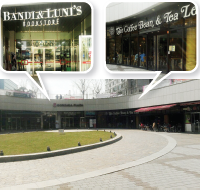
A cup of coffee, buying new clothes, painting the nails, and going to the hair salon. Where? Right on campus! We usually think these activities should be done offcampus. Now, facilities in school are changing. A definition of university in the dictionary is an institution where students study for degrees and where academic research is done. However, some buildings which are far from ‘study’ are built, like franchised restaurants and coffee shops, book stores, and convenience stores. Students are becoming a kind of customers of the university.


In 2004, Starbucks was built in Korea University. In those days, here was a boycott with the message : “Starbucks, which is the symbol of capitalism in the United States, cannot come to our sacred school.”1 However, from then, it became natural that other stores came to their campus. Also in Korea University, Central Plaza was built and more and more stores started to enter. And in Ewha Womans University, in 2008, Ewha Campus Complex building (ECC) was built. In this building, there are reading rooms and classrooms just like other buildings in the campus. However, there are also other stores which are not related to study, like a big book store, a coffee shop, a movie theater, a convenience store, and even an authorized retail cell phone store. In 2009, in Busan National University, NC Department Store was established at the front gate of the university. Likewise, more and more universities followed suit. Students of those campuses became comfortable because they did not need to go off-campus. However, we should think seriously about whether or not we are deceived by schools which hide behind “convenience.”
Money from Student, Money to University
In university, students are becoming not only people who come to be educated, but also customers who come to spend money. According to the report from Korea Higher Education Research Institute, they said, “It becomes 1 Kim management specialists manage stores in universities rather than direct control. Through this, companies can get money from selling, so they donate to the university to get confirmation. And in the case of the university, the donation from companies can be written as a result, so they prefer that.”2 Also in this report, in 2009, private universities made over 1.2 trillion won from only rental fees.3 That means university earned money which was spent by students. Then those profits should be used for students, and also it is stated in the regulations. However last November, when we see the data from the Board of Audit and Inspection of Korea which investigated 35 universities, there were six universities which pocketed that money. It reached 710 billion won.4 If that money were used for students, it might help cut the tuition. But there are still some universities which break the egulations. Also students have to pay more than before because of franchised stores. In most cases of franchised stores, the price is higher than just a student restaurant. Ewha Womans University student Kim Huijeong said,“When I want to eat lunch on campus, I need at least 5,000 won because even a hamburger set, which is the cheapest, is 4,800 won. It is a lot more than the school cafeteria.” Last year at Seoul National University, fast food stores and famous coffee shops replaced the building that formerly housed the school cafeteria. It was 2500~3000 won in the school cafeteria, but now we cannot find that anymore. Also, a small snack bar in the Education College which sold jajangmyeon for 1500 won was replaced by a coffee shop that sells coffee for 5000 won.5

The Answer is Univ Coop
School should not be a place for selling things to students. To do that, students should lead first. The most typical thing is Korea University Cooperative Federation (Univ Coop). From last December, the law for cooperative direction took effect, so interest in it started to rise. Univ Coop is valuable because it is managed by people who use those facilities. In Kyunghee University, a student cafeteria is operated by Univ Coop. Store manager Choi Eunjung of Kyunghee University said, “We make a group purchase of groceries so we can buy things at a cheap price. So we can put 10% more ingredients in food and that lead to higher quality food.”6 Kyunghee University, Dongguk University, Ewha Womans University, and Seogang University started to manage stores by Univ Coop. So if this Coop becomes more natural on campus, students can spend money more rationally.

1 Kim Minchoel, “First ‘Star Bucks’ in Campus,” Saegaeilbo, ctober 27, 2004
2 Sun Myeongsoo, “’Prisoner of the Market’ Campus, There is Everything in Campus Except Bars,” Pressian, March 28, 2011
3 Same as Footnote 2
4 Jung Hwanbo, “The Problems Made from ‘Liberalization of University’…,” The Kyunghyang Shinmun, August 8, 2012
5 Kim Sori, “Students Cry Because of Heavy Price of Meal,” Seoul Shinmyun, September 20, 2011
6 Lee Jungbong, “How Could These School Cafeteria Succeeded?,” Nocutnews, January 25, 2013


